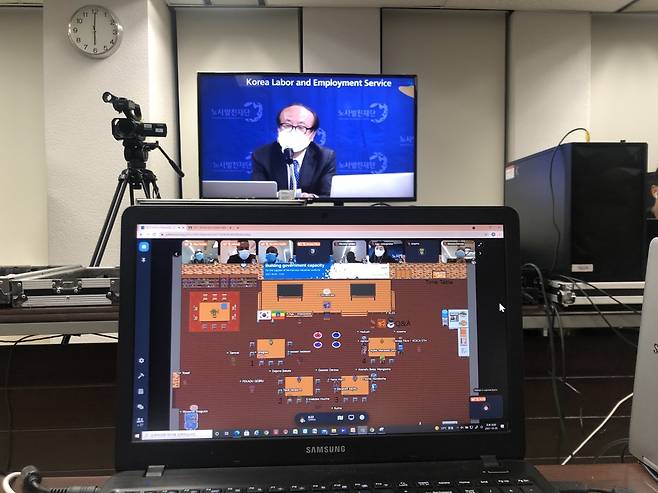KLES extends overseas outreach with specialty in labor and employment
이 글자크기로 변경됩니다.
(예시) 가장 빠른 뉴스가 있고 다양한 정보, 쌍방향 소통이 숨쉬는 다음뉴스를 만나보세요. 다음뉴스는 국내외 주요이슈와 실시간 속보, 문화생활 및 다양한 분야의 뉴스를 입체적으로 전달하고 있습니다.

It has been more than 10 years since South Korea entered the OECD Development Assistance Committee, which shifted the country’s status to a key donor from a onetime recipient of foreign aid.
The total volume of South Korea’s official development assistance now reaches some $2.25 billion, marking around a threefold increase over the past decade.
As the amount of assistance grows, the need to improve the quality of assistance has also grown in the past years, said the Korea Labor and Employment Service, a state-run organization under the Ministry of Employment and Labor.
According to the KLES, most of the ODA that goes into the labor sectors of developing countries is still limited in vocational training, although there are other issues related to work environment and employment.
The KLES has been working on projects to assess different needs and issues of developing countries that receive overseas aid. The goal is to provide customized technical assistance to the countries that face new labor and employment issues as their industrial capacities grow bigger.
Since the KLES first established diplomatic relations with Vietnamese labor unions in 1998, the organization has introduced several programs in foreign countries to help them improve labor and employment policies and related laws.
One noteworthy accomplishment was in 2019 when the KLES helped the Cambodian government introduce a minimum wage system for the first time.
To date, the Cambodian government has continued its discussions with the KLES to improve the minimum wage system, solve the country’s labor-management issues and introduce new policies and laws relating to the labor environment and employment.
The KLES has also bridged ties between South Korea and Ethiopia by introducing to them South Korea’s labor laws and policies.
The KLES expressed hopes that the organization can help Ethiopia to increase the union membership rate of public and private sector workers in the future.
In 2015, the KLES established its relationship with Laos and has continued its programs to this day, with an aim of helping the country’s government advance their labor and employment policies.
Between 2018-19, the KLES ran training programs in which officials at the Ministry of Labor and Social Welfare of Laos had participated.
In 2022, the KLES will officially embark on an ODA project dedicated to transfer South Korea’s labor and employment-related legislation and policies to the Lao government.
This year, the KLES and the Korea International Cooperation Agency also opened an online training on a metaverse platform and invited 23 officials from the Ethiopian government to promote South Korea’s promotion of labor-management cooperation and helped them build their own action plans.
During the training program, the KLES introduced the automaker’s implementation of the “Gwangju-type” job creation project of Hyundai Motor, which built a vehicle assembly plant in the Ethiopian capital Addis Ababa in 2019, the government-led initiative to create jobs through joint cooperation between local governments, businesses and residents.
“The KLES will continue to embark on assistance programs not only in South Korea but also in overseas countries and promote labor standards that can make the world to become sustainable, cooperative and socially responsible,” the KLES said.
By Shim Woo-hyun(ws@heraldcorp.com)
Copyright © 코리아헤럴드. 무단전재 및 재배포 금지.